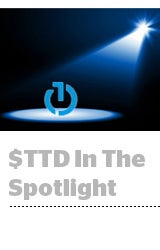 The Trade Desk generated $85.7 million in revenue during the first quarter of 2018, a 61% jump from the same period last year, the company disclosed in its earnings report Thursday.
The Trade Desk generated $85.7 million in revenue during the first quarter of 2018, a 61% jump from the same period last year, the company disclosed in its earnings report Thursday.
Profitability was also up, with net quarterly income reaching $9.1 million, compared to $4.9 million in Q1 2017.
The Trade Desk raised its 2018 revenue forecast to at least $433 million, a $30 million increase from the initial guidance it released in February.
“The secular tailwind of programmatic is strong,” said The Trade Desk founder and CEO Jeff Green.
Operating expenses increased by almost 50% from Q1 2017, with much of that increase driven by “platform operations,” passing “general and administrative” costs as the biggest internal investment.
“Our focus is on gaining share and revenue growth as this will ultimately maximize profitability over the long term,” Green said.
The biggest potential long-term growth driver for The Trade Desk’s business is the convergence of linear television and digital video through connected TV.
Spending on connected TV inventory in the past three months alone was almost equivalent to revenue in the category for all of 2017, with more than 2,000% growth from the first quarter last year, Green said. The company doesn’t break out spend by channel, however, and percent growth rates can be misleading when an early product gains revenue starting from zero.
The top ad-supported addressable channels don’t match up to linear TV, but advertisers’ concerns about connected TV’s lack of broadcast-caliber reach are evolving into concerns about missing out on otherwise unreachable incremental audiences.
In a study commissioned by The Trade Desk, Nielsen found about 40% of the connected TV audience wasn’t available on linear channels.
Data-Driven Revenue
The Trade Desk’s data marketplace is also a strong differentiator for the company, Green said. Data is growing as a percent of all dollars spent on the platform – meaning it’s taking share from media – and he expects data sales to continue to gain share, though it currently represents a low single-digit percent of total revenue.
“The upside in data is higher than the upside in media itself,” he said.
Aside from putting The Trade Desk in position to take more of the overall marketing pie, he said adding data to campaigns is a way to maintain customer retention despite heavy churn in the industry.
If an advertiser only wants audience reach, The Trade Desk might compare unfavorably to legacy channels such as radio and linear TV. When data is incorporated, it creates platform value and stickiness.
The Trade Desk’s new business and test campaigns that ran in March performed best in terms of retention because data expenditures for the month were at an all-time high for the platform, Green said.
Q1 2018 was the 17th consecutive period when The Trade Desk’s customer retention was above 95%.
GDPR At Last
What’s been missing from The Trade Desk’s earnings reports to date has been the company’s perspective on the General Data Protection Regulation (GDPR).
The Trade Desk has repeatedly said it wants its business to eventually look more like the global economic picture instead of being heavily weighted to North America. And the EU is the biggest single consumer bloc on Earth.
“I was waiting for someone to ask about GDPR,” Green said to one investor who inquired about the company’s response to the EU privacy law.
The Trade Desk seems relatively unconcerned about GDPR as a meaningful threat, or a threat at all, to its business.
Its guidance of $103 million in revenue for the second quarter reflects The Trade Desk’s estimation that even in the short term, GDPR won’t impede growth.
“The fundamental quid pro quo of the internet – publishers provide interesting content and consumers provide data and view advertising – isn’t going to change,” Green said.
And unlike Google, Facebook and Amazon, The Trade Desk doesn’t house personal data like phone numbers, names or emails.
The stewardship of that personal data has caused problems for the major platforms, such as Facebook’s Cambridge Analytica scandal or Google’s move to restrict use of the DoubleClick advertising ID, which Green said strengthens The Trade Desk’s position in the market since the DSP now has the largest audience ID coverage outside of those walled gardens.
“I believe The Trade Desk represents a safe harbor from concerns about data privacy,” he said.













